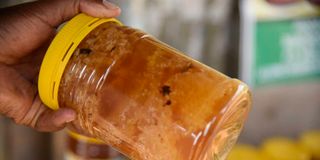Two dead, 19 hospitalised after eating poisonous wild honey

Two children died and 19 other people were hospitalised in Tharaka Nithi County after consuming poisonous honey.
Two children died and 19 other people were hospitalised at Marimanti Level Four Hospital in Tharaka Nithi County after reportedly consuming poisonous honey in Rukaani.
Musa Kirugi, a logger who was one of the victims, said the children became weak and started vomiting, diarrhearing and complaining of stomach pains about six hours after eating the honey on Thursday morning.
He said they were rushed to the hospital in an ambulance, private vehicles and motorbikes but one child died on the way and the other succumbed while receiving treatment.
“Most of the people who consumed the honey are children because those who harvested it from the tree went around sharing it,” Mr Gitonga said.
The honey, known as nchuura in the Kitharaka dialect, was discovered by loggers who had cut a tree for timber, he said.
Nchuura is not made by the common bees but by a species of smaller ones that do not sting and mainly live in hollow trees or abandoned holes in the ground.
Locals believe that nchuura, which is eaten raw, is medicinal and it is highly sought after, especially by pastoralists.
Tharaka North sub-county Police Commander Kimanzi Mwangangi said they were investigations the incident and that samples of the honey had been taken for tests.
He warned locals against consuming wild honey, noting that it had previously caused deaths.
He said most of the victims were members of the same extended family.
Stephen Kamanja, the Marimanti hospital nursing manager, confirmed the two deaths and said the other patients were in a stable condition, while one had been discharged.
“One child died while being rushed to hospital and the body is in the mortuary and the other succumbed while receiving treatment,” Mr Kamanja said.
Poisonous wild honey
In May, two people from Kiaruni village in Tharaka South died and eight others were treated at Marimanti Sub-County Hospital after reportedly consumed poisonous wild honey.
In July last year, three people in Muguruka village, Tharaka South, died and four others were treated at the same hospital after reportedly consuming a brew made from honey.
This came a day after a seven-year-old boy in Gichiini village in Tharaka North died and four others were successfully treated at a hospital in Mukothima after eating raw honey.
In June last year, two family members in Riamikui village in Tharaka North died and another was successfully treated at Meru Teaching and Referral Hospital after reportedly consuming poisonous honey.
All these deaths were reported in the Tharaka community, whose members practise traditional bee farming mainly to produce honey for domestic consumption, sell it at local markets and prepare traditional alcohol known as uki.
The cases have raised questions about the safety of the delicious bee product.





